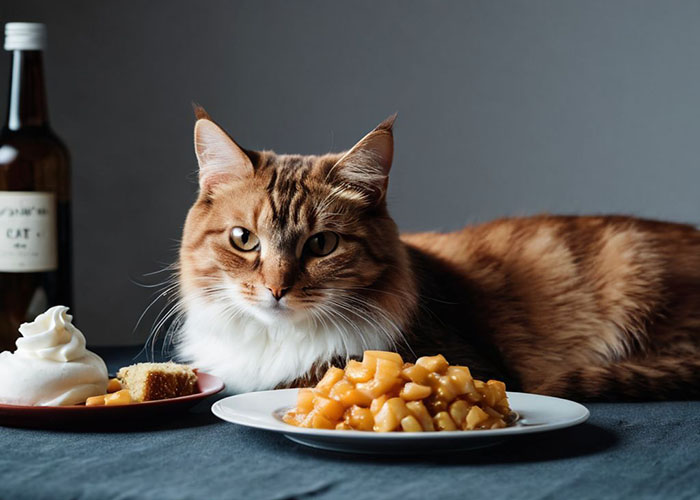As cat owners, we want to provide our furry friends with the best possible care and nutrition. However, what may seem like a harmless treat to us could actually be harmful or even toxic to our cats. It’s important to educate ourselves on what foods are safe for our feline companions and which ones should be avoided at all costs. In this article, we will discuss 10 foods that you should never give to your cat.
Chocolate and Caffeine: A Dangerous Combination
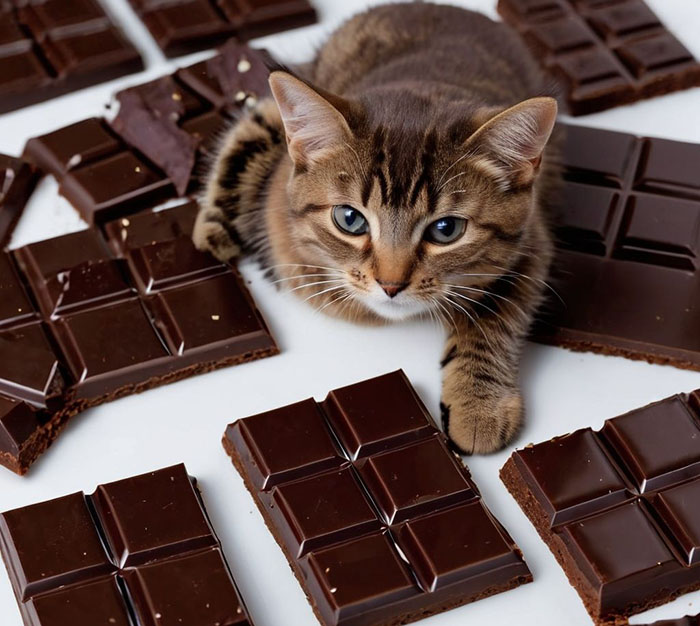
Chocolate and caffeine are two common ingredients found in many of our favorite treats, but they can be extremely dangerous for cats. Both contain substances called methylxanthines, which can cause vomiting, diarrhea, rapid breathing, and even seizures in cats. Dark chocolate and baking chocolate are especially toxic as they contain higher levels of methylxanthines. It’s best to keep all forms of chocolate and caffeinated products away from your cat.
Symptoms of Chocolate and Caffeine Poisoning in Cats
If your cat has ingested chocolate or caffeine, you may notice the following symptoms:
- Vomiting
- Diarrhea
- Rapid breathing
- Increased heart rate
- Muscle tremors
- Seizures
- Hyperactivity
- Restlessness
If you suspect that your cat has consumed chocolate or caffeine, it’s important to seek veterinary care immediately.
Safe Alternatives for Your Cat
If you want to treat your cat, there are plenty of safe alternatives to chocolate and caffeine. Some options include small pieces of cooked chicken or fish, freeze-dried meat treats, or specially formulated cat treats from your local pet store.
Onions and Garlic: More Than Just Bad Breath
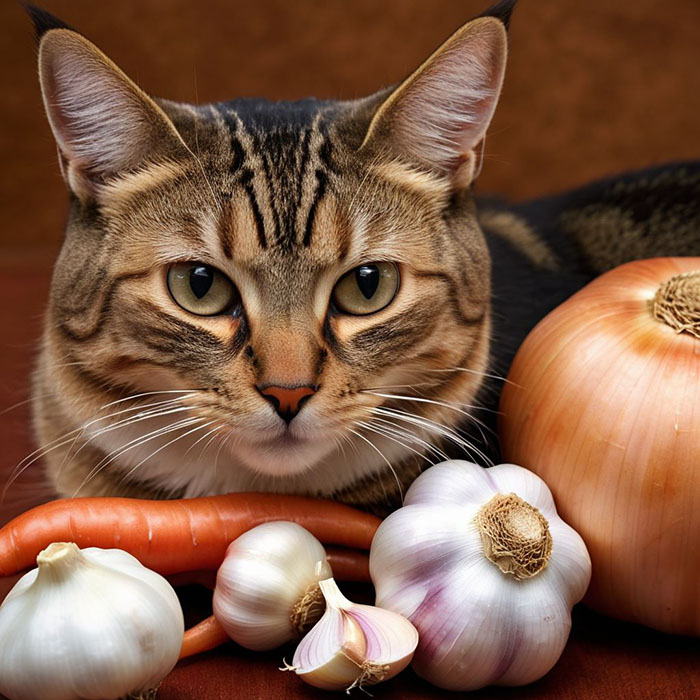
Onions and garlic may add flavor to our meals, but they can be deadly for cats. These vegetables contain compounds that can damage red blood cells in cats, leading to anemia. Even small amounts of onion or garlic can be toxic, and it’s important to keep them away from your cat’s food bowl.
Symptoms of Onion and Garlic Poisoning in Cats
If your cat has ingested onions or garlic, you may notice the following symptoms:
- Weakness
- Lethargy
- Pale gums
- Rapid breathing
- Vomiting
- Diarrhea
- Loss of appetite
- Dark urine
If you suspect that your cat has consumed onions or garlic, seek veterinary care immediately.
Safe Alternatives for Your Cat
Instead of using onions or garlic to add flavor to your cat’s food, try using herbs like parsley, basil, or oregano. These herbs are safe for cats and can provide a tasty alternative to potentially harmful ingredients.
Grapes and Raisins: A Hidden Danger
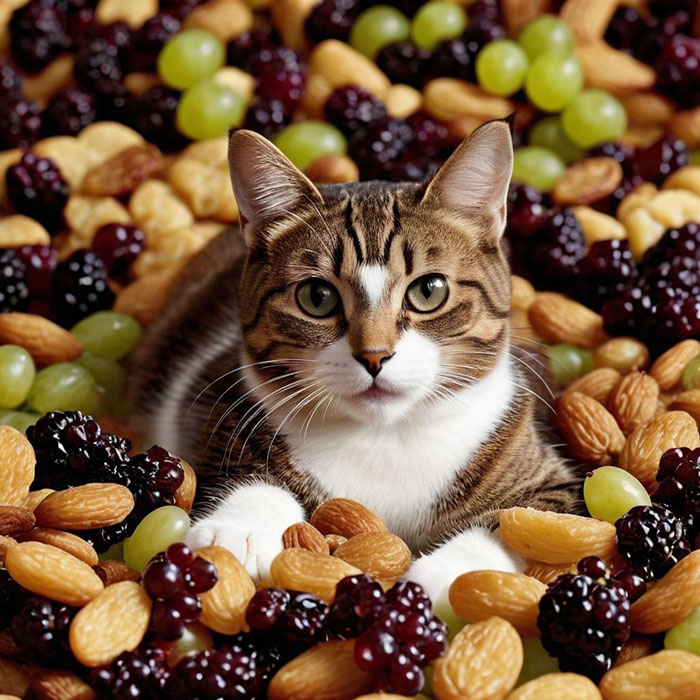
Grapes and raisins may seem like harmless snacks, but they can actually be toxic to cats. The exact substance in these fruits that causes toxicity is unknown, but even small amounts can cause kidney failure in cats. It’s best to avoid giving your cat any grapes or raisins, including those found in baked goods or trail mix.
Symptoms of Grape and Raisin Poisoning in Cats
If your cat has ingested grapes or raisins, you may notice the following symptoms:
- Vomiting
- Diarrhea
- Lethargy
- Loss of appetite
- Increased thirst and urination
- Weakness
- Tremors
- Seizures
If you suspect that your cat has consumed grapes or raisins, seek veterinary care immediately.
Safe Alternatives for Your Cat
If you want to give your cat a fruity treat, opt for cat-safe fruits such as apples, bananas, or blueberries. Just be sure to remove any seeds or pits before feeding them to your cat.
Maybe you should know 8 Common Houseplants That Are Harmful to Cats
Raw Meat and Fish: Not Worth the Risk
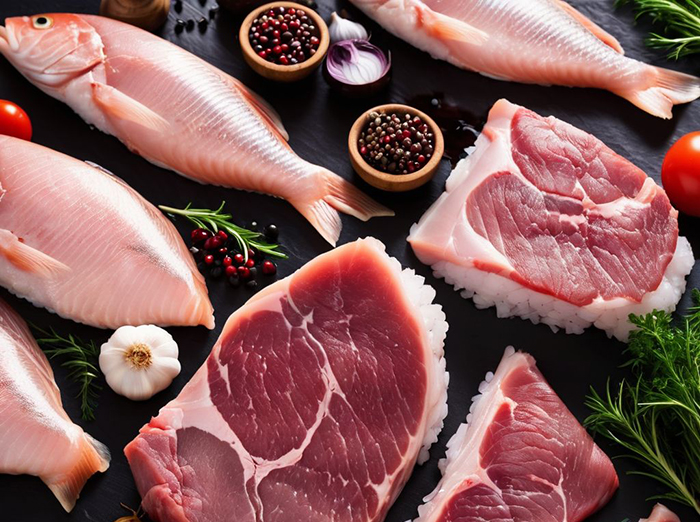
While cats are natural carnivores, feeding them raw meat or fish can be dangerous. These foods may contain bacteria such as E. coli or Salmonella, which can cause food poisoning in cats. Additionally, raw fish contains an enzyme that destroys thiamine, an essential B vitamin for cats. Without enough thiamine, cats can develop neurological problems and even become paralyzed.
Symptoms of Food Poisoning in Cats
If your cat has consumed raw meat or fish contaminated with bacteria, you may notice the following symptoms:
- Vomiting
- Diarrhea
- Lethargy
- Loss of appetite
- Fever
- Dehydration
- Weakness
- Tremors
If you suspect that your cat has consumed contaminated raw meat or fish, seek veterinary care immediately.
Safe Alternatives for Your Cat
Instead of feeding your cat raw meat or fish, opt for cooked versions. Cooked chicken, turkey, or fish can make a tasty and safe treat for your feline friend.
Xylitol: A Sweetener That’s Deadly for Cats
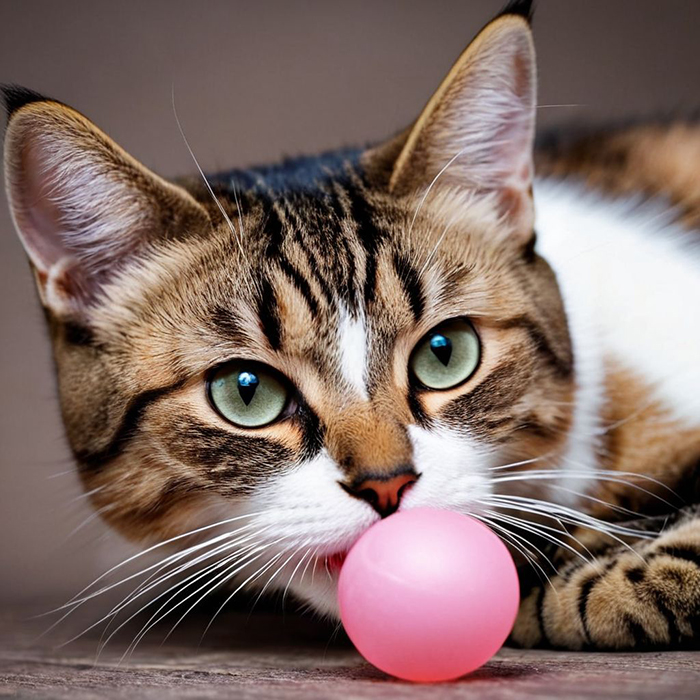
Xylitol is a sugar substitute commonly found in sugar-free gum, candy, and baked goods. While it may be safe for humans, it’s extremely toxic to cats. Xylitol can cause a rapid release of insulin in cats, leading to low blood sugar levels and potentially liver failure. It’s important to keep all products containing xylitol away from your cat.
Symptoms of Xylitol Poisoning in Cats
If your cat has ingested xylitol, you may notice the following symptoms:
- Vomiting
- Weakness
- Lethargy
- Loss of coordination
- Seizures
- Coma
- Liver failure
If you suspect that your cat has consumed xylitol, seek veterinary care immediately.
Safe Alternatives for Your Cat
If you want to give your cat a sweet treat, opt for small amounts of honey or maple syrup. Just be sure to check the ingredient list to ensure that there is no xylitol present.
See more about The Ultimate Guide to Selecting the Best Food for Your Cat
FAQs
What should I do if my cat has consumed one of these foods?
If you suspect that your cat has consumed any of the foods mentioned in this article, it’s important to seek veterinary care immediately. Even small amounts of these foods can be toxic and potentially life-threatening for cats.
Are there any other foods that I should avoid giving my cat?
Yes, there are many other foods that are not safe for cats. Some common ones include alcohol, avocado, macadamia nuts, and dairy products. It’s always best to consult with your veterinarian before giving your cat any new foods.
Can I give my cat table scraps?
While it may be tempting to share your meal with your cat, it’s best to stick to their specially formulated cat food. Table scraps can contain ingredients that are harmful to cats, and they can also lead to obesity and digestive issues.
Is it okay to give my cat milk?
Contrary to popular belief, most cats are actually lactose intolerant. This means that giving them milk can cause digestive upset and diarrhea. If you want to give your cat a dairy treat, opt for lactose-free options such as yogurt or cheese.
How can I ensure that my cat is getting a balanced diet?
The best way to ensure that your cat is getting all the necessary nutrients is to feed them a high-quality, commercially prepared cat food. These foods are specifically formulated to meet the nutritional needs of cats and are a safer option than homemade diets.
Conclusion
As cat owners, it’s our responsibility to keep our furry friends safe and healthy. By avoiding these 10 foods and sticking to a balanced diet, we can ensure that our cats live long and happy lives. If you have any concerns about your cat’s diet, be sure to consult with your veterinarian for personalized advice. Remember, when it comes to our cats’ health, it’s always better to be safe than sorry.

